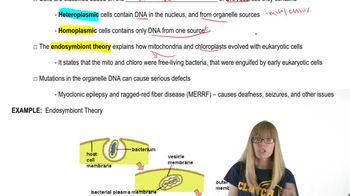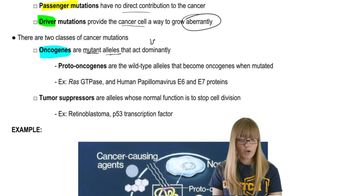- 1. Introduction to Genetics51m
- 2. Mendel's Laws of Inheritance3h 37m
- 3. Extensions to Mendelian Inheritance2h 41m
- 4. Genetic Mapping and Linkage2h 28m
- 5. Genetics of Bacteria and Viruses1h 21m
- 6. Chromosomal Variation1h 48m
- 7. DNA and Chromosome Structure56m
- 8. DNA Replication1h 10m
- 9. Mitosis and Meiosis1h 34m
- 10. Transcription1h 0m
- 11. Translation58m
- 12. Gene Regulation in Prokaryotes1h 19m
- 13. Gene Regulation in Eukaryotes44m
- 14. Genetic Control of Development44m
- 15. Genomes and Genomics1h 50m
- 16. Transposable Elements47m
- 17. Mutation, Repair, and Recombination1h 6m
- 18. Molecular Genetic Tools19m
- 19. Cancer Genetics29m
- 20. Quantitative Genetics1h 26m
- 21. Population Genetics50m
- 22. Evolutionary Genetics29m
19. Cancer Genetics
Cancer Mutations
Problem 25b
Textbook Question
Mutations in tumor-suppressor genes are associated with many types of cancers. In addition, epigenetic changes (such as DNA methylation) of tumor-suppressor genes are also associated with tumorigenesis [Otani et al. (2013). Expert Rev Mol Diagn 13:445–455].
Knowing that tumors release free DNA into certain surrounding body fluids through necrosis and apoptosis Kloten et al. [(2013). Breast Cancer Res. 15(1):R4] outline an experimental protocol for using human blood as a biomarker for cancer and as a method for monitoring the progression of cancer in an individual.
 Verified step by step guidance
Verified step by step guidance1
Understand the role of tumor-suppressor genes: These genes help regulate cell growth and division. Mutations or epigenetic changes can lead to uncontrolled cell growth, contributing to cancer.
Explore the concept of epigenetic changes: DNA methylation is a common epigenetic modification that can silence tumor-suppressor genes, preventing them from controlling cell growth.
Recognize the significance of free DNA in body fluids: Tumors can release DNA into body fluids like blood through processes such as necrosis and apoptosis, providing a potential biomarker for cancer.
Review the experimental protocol by Kloten et al.: This involves analyzing free DNA in blood to detect cancer-related changes, offering a non-invasive method for cancer diagnosis and monitoring.
Consider the implications for cancer monitoring: Using blood as a biomarker allows for tracking cancer progression and response to treatment, potentially improving patient outcomes.
Recommended similar problem, with video answer:
 Verified Solution
Verified SolutionThis video solution was recommended by our tutors as helpful for the problem above
Video duration:
1mPlay a video:
Was this helpful?
Key Concepts
Here are the essential concepts you must grasp in order to answer the question correctly.
Tumor-Suppressor Genes
Tumor-suppressor genes are critical components of the cellular machinery that regulate cell growth and division. When these genes are mutated or inactivated, they can no longer perform their function of preventing uncontrolled cell proliferation, leading to tumorigenesis. Examples include the TP53 and BRCA1 genes, which are often implicated in various cancers.
Recommended video:
Guided course

Mapping Genes
Epigenetic Changes
Epigenetic changes refer to modifications that affect gene expression without altering the underlying DNA sequence. One common form is DNA methylation, where methyl groups are added to DNA, often silencing gene expression. In the context of tumor-suppressor genes, abnormal methylation patterns can contribute to cancer development by turning off genes that normally inhibit tumor growth.
Recommended video:
Guided course

Chromatin
Circulating Free DNA (cfDNA)
Circulating free DNA (cfDNA) is DNA that is released into the bloodstream from dying cells, including tumor cells. The presence of cfDNA can serve as a biomarker for cancer, as it may contain mutations or epigenetic alterations specific to tumors. Analyzing cfDNA can provide insights into cancer progression and response to treatment, making it a valuable tool in oncology.
Recommended video:
Guided course

Organelle DNA Characteristics

 4:50m
4:50mWatch next
Master Cancer Mutations with a bite sized video explanation from Kylia Goodner
Start learningRelated Videos
Related Practice


